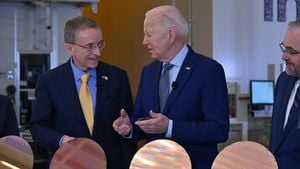Nick Cannon, the multi-talented entertainer known for his various ventures from hosting shows to being the father of 12 children with six different women, has recently opened up about his mental health struggles following his diagnosis with Narcissistic Personality Disorder (NPD).
During an episode of his podcast, "Counsel Culture," Cannon dropped the unexpected news about his diagnosis, expressing his feelings of confusion and desire for clarity. "I still don’t understand it all the way, but I kind of always wanted to get tested for it. I did a bunch of tests," the 44-year-old star shared with People magazine.
Understanding Narcissistic Personality Disorder can be complex. According to the Mayo Clinic, this mental health condition is characterized by symptoms including inflated self-importance, the need for excessive admiration, and difficulty empathizing with others. Those affected may frequently fantasize about unlimited success and struggle to handle criticism. Cannon revealed he's recognized many aspects of this disorder within himself.
Despite the stigma often attached to mental health issues, Cannon is embracing his diagnosis as a chance for growth. He emphasized, "I feel like there’s so many labels out there, but it’s like, to be able to embrace it and say, ‘Look, I’m healing. I need help. Show me.’" He has committed himself to therapy, reinforcing the importance of mental health awareness.
Nick's openness about his mental health issues even extends to his experience with other neurodivergent conditions like ADHD and dyslexia. He mentioned, "I’ve been diagnosed with ADHD. Even as a kid it was dyslexia, but just knowing I’m just a neurodivergent individual, I kind of always knew." By sharing these insights, he hopes to encourage others to acknowledge their mental health challenges and seek help.
Recently, Cannon took time from his busy schedule to give back to the community, joining fellow celebrities at the Los Angeles Mission during Thanksgiving. Together, they served thousands of meals to those in need, as he does around the holidays. He humorously remarked on the challenges of juggling his large family, saying, "I’m busy man; it’s very complicated." Thanksgiving dinners can become quite the marathon for him, as he juggles different households where his children reside.
His family dynamic is quite extensive, with 12 kids spread across several relationships, including two with his ex-wife, pop icon Mariah Carey. He quipped about the many festive dishes he looks forward to at each stop, noting the variances his family members bring to the table—like sweet potato pie and fried turkey. "I know every house needs to have the things I really like," Cannon said.
On his podcast, Cannon invited Dr. Cheyenne Bryant, a psychologist, to break down the nuances of Narcissistic Personality Disorder. During this enlightening conversation, Cannon identified with many of the markers of the condition she described, emphasizing the importance of self-awareness and growth.
Cannon's dedication to healing and growth is palpable. He expresses how restorative it can be to seek help and admits, "To be able to say I’m an example for others, but also be healing during the self-process works too." His candid discussion of his personal experiences is part of a larger narrative encouraging mental health advocacy.
His public admission of needing help is not just personal; it resonates with many who may feel alone or misunderstood due to their mental health challenges. Cannon's willingness to share his story encourages others to speak up and embrace their own journeys to mental well-being.
Through his actions, Nick Cannon is redefining what it means to be open about mental health. He exemplifies how being vulnerable can be powerful and inspiring, showing others it's okay to seek support. You can have a successful career and face personal struggles but still come out stronger on the other side.
Cannon's story isn't just about his diagnosis; it's about the broader message of accepting oneself and committing to personal growth. It serves as a reminder—as we all navigate our unique challenges—that seeking help is not just okay; it can be the beginning of something greater. He’s proving to be not just a parent or performer but also a beacon of hope and resilience for many.



